Anna Kettle's Blog, page 9
September 7, 2020
Embracing the Season

What is your favourite season?
September is here, and can’t you just feel the changing of the seasons in the air?
But I wonder, how do you actually feel about this coming season? Perhaps you are more than ready for a change, or conversely perhaps you just aren’t quite ready for the summer to be over just yet…
If I’m honest, I often struggle with the approaching fall. I know that lots of people love this time of year. But I don’t much care for it. I am more of a summer person, you see. I just love the sociability that the warmer weather brings; the BBQs, beer gardens, beach trips, and picnics… the way that all the neighbourhood kids play our on our street by day, and the way we gather round the firepit with friends in the garden by night.
So right now I am clinging onto the last moments of summertime with all that I have, and trying to wrangle every last moment of goodness from them that I can!
Perhaps I’d feel differently if I lived in a warmer climate, but being a Brit I don’t much care for it. The problem is that our British summers are just so short, and always feel gone far too soon…
Each year September suddenly appears with a jolt, and a flurry of ‘back to school’ busyness, and in an almost undetectable instant, the summer fades away. Gone are those long, warm summer nights, replaced seemingly overnight by days that are darker, nights that are longer, skies that are greyer, and weather that is colder - all early warning signs of the long and lingering winter months ahead.
So I don’t really like the fall, it’s true. And if I could choose to live in summer all the time, I probably would! But the fact is that I really can’t spend more than half of every year feeling negative or wishing that I could be somewhere else (ideally somewhere hot and with a beach!)
But as the years go on, I am getting better at learning to accept every season in nature as a necessary and needed part of life.
A time for everything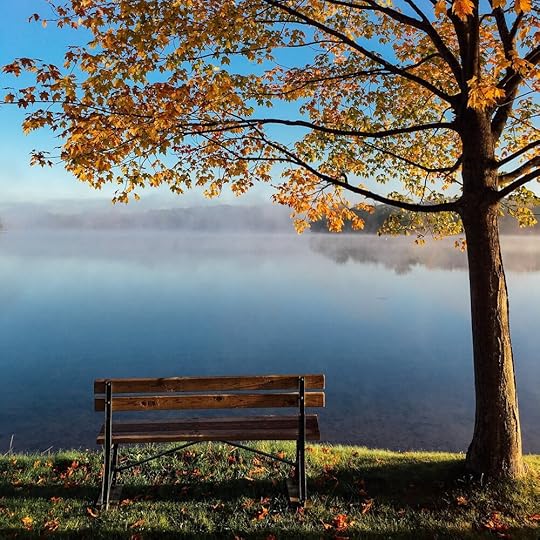
One of very my favourite passages in the Bible is Ecclesiastes 3, a fairly well known piece of poetry which is all about the different metaphorical seasons of life that we can each encounter with the passing of time; seasons of birth and seasons of death, seasons to plant and seasons to uproot, seasons of hurting and seasons of healing, seasons of joy and seasons of despair...
But right in the very opening refrains of this beautiful passage is this reminder that everything in life has it’s time and it’s place.
“There is a time for everything,and a season for every activity under the heavens.” (Ecclesiastes 3:1)
Of course, there are seasons of life that we all love to be in; seasons of breakthrough, celebration, and joy - but surely this promise about there being a time for everything, is just as true for the more challenging seasons as well?
Without some moments of sadness, how would we fully enjoy those moments of joy? Without some moments of difficulty, how would we ever learn to overcome? And without some seasons of loss, how well would we truly appreciate all that we have?
Although the fall may not be my favourite season, I am learning that every season has it’s times and it’s purpose; and although not every season feels as enjoyable as the next, I do believe that there is growth and learning to be found from it all.
What the fall is teaching me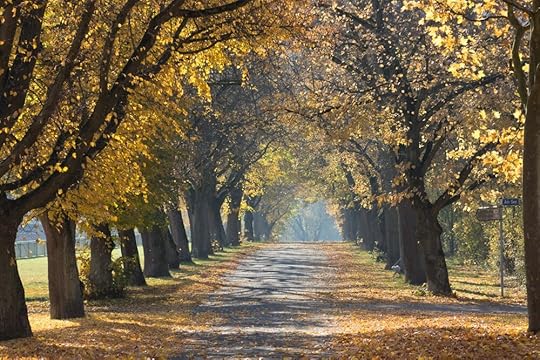
There’s a famous quote from an unknown source that I see posted on social media a lot around this time of year and it says this:
“The trees are about to show us how lovely it is to let the dead things go.”I think this is so true. But the act of letting old things go is often much easier said than done - especially when it comes to trying to hold on to old memories, hopes, dreams, or to the people and things that we love. Change can be really hard on our human hearts, can’t it?
But just as nature’s seasonal shifts keep making space for the dead things to fall to the ground and die so that something new can begin to bud up and grow, isn’t this also often so true in our lives? Sometimes we need to let go of those things that are no longer serving us or bearing any fruit.
There is a time and a purpose for every season, because every season prepares the way for the next one… and then the one that comes after that. And in that respect, every season is a gift from God. Even the seasons of life that feel the hardest.
What season of life are you in?
I wonder what kind of life season you are in right now… have you paused to consider this recently?
For many of us, myself included, this present season is one of transitioning from the summer break, back into a more normal routine and pace of life around school and work. For many more of us, this season is one of uncertainty, as the impact of the coronavirus pandemic continues to unfold.
For me, this is also a season of waiting too; waiting to get pregnant or not get pregnant again, waiting for a conclusion to our three year battle to have a second child, and waiting to finally be able to move onto a totally new chapter of our lives…
It probably goes without saying that this particular season of infertility in my life hasn’t been an easy one. It’s just been laced with so much loss and grief. Sometimes those seasonal changes just can’t come quick enough, can they?
But right in the midst of this season filled with waiting and longing for what’s next, each seasonal change within nature has become a kind of gift to me - a sort of reminder etched by God into nature itself that nothing lasts forever. Every season is finite. Everything has a beginning and an end, and He promises to make everything beautiful again in time.
Getting through hard seasons
So on the one hand this fall is a hard season for me, both physically and metaphorically too.
But instead of resisting it, resenting it, wasting time complaining about what has been left behind with summer, or wishing I could be somewhere else, what if I actually looked for the goodness and proactively seek out the joy?
So this autumn/fall, I have decided to embrace the changing season and to focus on all that’s good in the passing of summer to winter. Because isn’t this the best way to get through any season in life that we don’t like?
And for me, that looks like really focusing in on all the things that I do like about the fall, and seeking out the beauty and the goodness right here in this season I am in. In fact, I have even written a list of 21 things I love about the fall to help get me kickstarted which you can link to below...
21 things I love about the fall...
August 21, 2020
On (over) busyness

Saying no to over-busy
How many of us have bought into the lie that the more you can possibly cram into each day, the more meaningful it will be?
Busyness has become such an idol of our age, hasn’t it? Just look at the kind of conversations we have:
‘How are you?’ ‘Good, busy. Life is just so busy right now …’
‘Sorry I’ve not been in touch, I’ve just been completely rushed off my feet …’
‘Lets get a diary date in to catch up. Oh wait, I’ve not got any free space until July…’
Am I on my own here? I doubt it… The truth is that busyness has become such a social norm for most of us these days, that we barely even pause to question why our lives are so full.
Busyness is not spiritual
But busyness is simply not a spiritual gift. Quite the opposite, in fact. Because when busyness finds us constantly running from one thing onto the next, like human robots, trying to keep up with everyone and everything, it leaves us over-worked, over-stretched, over-stressed, and yet spiritually under-nourished.
And deep down I think we all know that busyness isn’t very good for us as well. It isn’t making us any more productive, or creative, or compassionate, or happy, or fulfilled.
It prevents us from really connecting properly with God, with others around us too. Heck, it even prevents us from connecting with ourselves.
When we’re too busy and hurried, often we forget to pray and live without any real awareness of God’s presence with us during our days.
When we’re too busy, often we just skim along the social surface of conversations and go through the motions with others, but fail to really engage, to take the time to listen, or to care.
And when we’re too busy, we tend not to make time for proper self-reflection, for processing our thoughts and feelings, and fail to grow as a result.
Have you ever found yourself snapping at someone over something really small and insignificant – and then thinking afterwards, ‘What is wrong with me? Why did I do that?’ Often it’s not even about that thing at all, is it?
Maybe it’s because we’re so frantic and frazzled from running from A to B for so long, that we haven’t given ourselves any time to reflect on or process our emotions – and then eventually they just spill out at the wrong time, and often at the wrong person.
Why are we so busy?
Jeremiah 2:25 says this: “Do not run until your feet are bare and your throat is dry. But you said, ‘It’s no use! I love foreign gods, and I must go after them.”
Isn’t this still just so relevant for our times?! Because even though many of us know we’re running too fast and working too hard, we won’t or can’t or don’t know how to really slow down.
We’ve got money to earn, bills to pay, jobs & family to juggle, and responsibilities to attend, …and hey, all this stuff that we don’t really need, won’t just pay for itself!
Sometimes I wonder if we just need to step back from it all for a few moments ‘… to be still, and just to know that He is God’ as Psalm 46:10 phrases it.
Be still and know.
Be still to remind yourself that we don’t have to continually strive and overstretch ourselves like this.
Be still to remind yourself that most of the stuff we are busy over really doesn’t matter.
Be still to remember that He is bigger than our best efforts.
Be still to remember that we are so loved.
Don’t we all need this kind of holy pause sometimes? Because aren’t we all so easily sidetracked and distracted, and swept away from our focus, by the constant changing tides and currents of the day…
Maybe that’s why the apostle Paul’s reminder in Ephesians 5 to be careful about how we live still seems so relevant today too.
“Be very careful, then, how you live — not as unwise but as wise, making the most of every opportunity, because the days are evil. Do not be foolish, but understand what the Lord’s will is.” (Ephesians 5: 15-17)
To be honest, I used to interpret this verse as ‘Do more to serve God because time is short and you need to make every second count’; but now I actually read it to mean ‘Do less’ instead.
Because this passage is not an invitation to an ever more crammed-full, stressed out, and hurried way of living. It’s an invitation to slow down and to live in a much more considered and intentional way.
In short – it’s about doing the right things; not just doing more things.
It’s also a reminder to be wise about what those right things are.
And it’s about knowing when to say no – even to some perfectly good and well-meaning – things in order to pause in your life and space for you to breathe.
5 tips for slowing down
So how do we put all this into practice? Well, here’s a few of my ideas after reflecting on Paul’s words in Ephesians 5:
1. Pause & reflect – ‘Understand what the Lords will is’
Why not start by taking the time to pause, reflect and really understand what the Lord’s will is for your lives? And if you’re not sure what your priorities should be – why not ask Him to show you?
2. Focus in & prioritise – ‘make the most of every opportunity’
If you feel over-extended or spread too thinly, it’s time to prioritise. Don’t just keep on doing everything, because it’s the surest route to burnout… instead identify your key priorities and decide to really focus on these things. Then make sure you give them the appropriate time & effort to really do them well.
3. Let some stuff slide – ‘be careful how you live’
In order to ensure that this happens, you might also need to be willing to lay some other stuff down – at least for a season. So ask yourself – which activities and commitments needs to stay in your diary and your life, and which ones need to go? Don’t be scared to let some of the unimportant stuff slide for a while…
4. Don’t be so easily side-tracked or distracted - ‘don’t be foolish’
It’s so easy to start with good intentions but end up distracted, and before you know it you’ve spread yourself too thinly again. So get a bit disciplined with your time, and don’t waste it all away on things that don’t matter. Don’t flit it away on Netflix, social media or your phone…
5. Be accountable
Finally – and perhaps most crucial to success – I recommend that you tell someone else about your life reordering decisions. Or maybe even a few different people different. Get people close to you to hold you to account and give them permission to challenge you when they see you veering off course and getting distracted or over-busy again.
August 20, 2020
5 tips for inner calm when there’s no ‘ideal’

When there’s ‘no ideal’ option
Decision making is rarely easy, when there’s several options to weigh up. But what do you do when none of the different options or scenarios in front of you feels exactly ‘ideal’? It’s a question I’ve been asking myself quite a lot lately…
Like many parents, we have been wrestling with questions about the current schooling situation over recent weeks. Should we really be sending our kids back to school yet, or is it better to distance learn or home school for this season?
Part of the problem is that there’s really no ‘ideal option’ because in an ideal world everyone would be vaccinated long before returning to work or school. But since that reality is still some way off, parents are instead left weighing up their own unique set of circumstances and deciding which is the ‘least bad’ option. And this is uncomfortable ground because as parents we all just want ‘the very best’ for our kids.

I am also asking this question about our current fertility journey a lot at the moment too.
Living with low level anxiety caused by constant uncertainty is a common experience amongst couples facing fertility complications. And of course, going into what will probably be our final shot at another pregnancy feels like an anxious time.
But the other day my husband Andy, who is generally much calmer and less highly strung about all of this than me, said something that stopped me in my tracks. He was feeling really anxious too. As we continued to unpack this in our conversation, I quickly realised the anxiety he was experiencing was specifically related to the fact that none of the options left on the table felt ‘ideal’ anymore.
I mean, our ‘ideal’ scenario would have been having another sibling for our son two summers ago, instead of experiencing three miscarriages and then facing long periods of waiting for tests and treatments. But instead, these are the only possible options we have ahead of us now:
Either our current fertility treatment doesn’t work - and then we have to definitively decide whether to give up for good. Not our ideal.
Or we get pregnant but we miscarry again, and then we have to face the trauma and heartache of yet another loss, along with the final certainty that medicine can’t fix things. Not our ideal.
Or we actually have another baby, but it’s harder than before because we are older parents now, it’s been a long time since we had a newborn, and there’s a six year age gap to juggle with our son. This third option is a better one for sure, but it’s still not our ‘ideal’.
5 ways to find inner calm
So what do you do when none of the scenarios in front of you feel totally ‘ideal’? And when you have every reason to feel anxious about what’s ahead, how do you find any peace or hold onto any sense of inner calm? Well, here’s a few ideas…
Turn off the external noise
It’s not a bad thing to do some research on a subject that’s making you anxious, but I also find that it’s easy to become overloaded by lots of unhelpful and conflicting views and opinions - especially online.
Of course, it’s understandable to what to know all the statistical odds or various rare risks could be, and also to hear the experiences and opinions of other moms; but in my experience too much time spent on google often only throws up more possibilities to worry about that I hadn’t even considered before! And it rarely offers me any peace or clarity of mind. Besides, in the end, all this reading and knowing about a subject doesn’t really change a thing! Your outcome will be your outcome.
So why not practice stepping away from your keyboard or buzzing phone for a while, and try stilling your mind instead? As the Psalmist wrote in Psalm 46:10, ‘Be still, and know that I am God’ - or to translate this sentiment into more modern language, stop fretting because you are not ultimately in control of every variable in your situation, and what will be - will be.
2. Pray, don't worry
I think it can be easy to fool ourselves into thinking that if we have prayed about something, we have given all of our worries over to God. But in reality, too often we just keep picking them right back up again as soon as our prayers are finished. Or is that just me?
Sometimes we can even end up “prayer-worrying” which is the unhealthy habit of bringing the same anxious thoughts to God over and over again, and calling it ‘prayer’.
I’m not suggesting that there is no place for faith and perseverance in prayer, but when the Bible says ‘Cast all your anxiety onto him because he cares for you’ (1 Peter 5:7) I think that means giving our worries over to Him fully, and resisting the urge to pick them back up again. And I think it means completely letting go of the need to control things ourselves, as we choose to trust in His care for us.
3. Accept what is beyond your control
Most of us like to believe that we’re in control of every aspect of our lives, but as Proverbs 16:9 reminds us, we’re really not: ‘In their hearts humans plan their course, but the Lord establishes their step.’
Despite our very best attempts at organising and planning for every possible eventuality, sometimes the unexpected can come along and completely disrupt all of our best laid plans. (Hello 2020, I’m looking at you!)
At times, it feels like we need a periscope that allows us to see what’s around the next corner or a crystal ball to tell us our future and help us second-guess all of our decisions. But actually, what we have is far, far better! We have a God who is in control of all things, and who the Bible says we can trust without fail.
This year may have been a surprise to us, but nothing about 2020 is a surprise to our God. Isn’t that reassuring to know? So when we are faced with situations that we can’t control, let’s remember who IS in control, and let’s learn to trust Him through it.
4. Try not to get ahead of yourself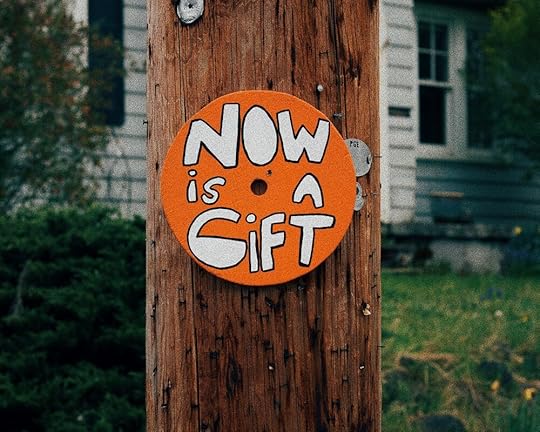
Some of my very favourite words of Jesus are recorded in Matthew 6:34, ‘Therefore do not worry about tomorrow, for tomorrow will worry about itself. Each day has enough trouble of its own.’ Isn’t that advice to live by? Because don’t we do this to ourselves all the time?
If I’m honest, I think that most of my anxiety in life comes from worrying about things that haven’t even happened yet (and may well never do), which is such a waste of mental energy! What if my son goes back to school, but then there is a local coronavirus outbreak which disrupts us all again? Or what if we get pregnant again, but then we discover that something is wrong with that hypothetical unborn child?
Do you see how this works? Too often we let all of our inner peace be stolen by hypothetical possibilities! So try not to get too many mental steps ahead of yourself, and practice staying more fully present in the moment. Stick to working on what’s in front of you today!
5. Ask Him for his peace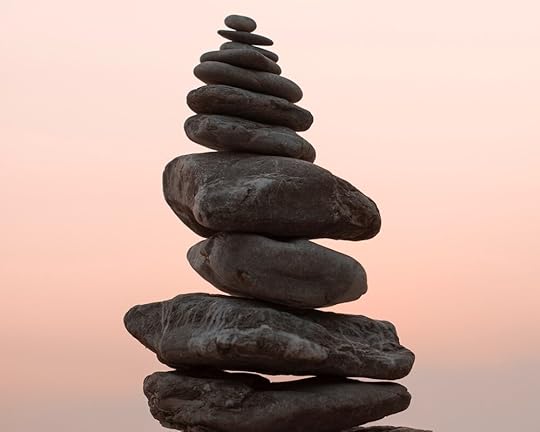
Self-care has become such a buzz word lately, and it seems like there’s no end of massages, hot yoga classes, mindfulness practices, therapy sessions, relaxing spas and more… all promising us some ‘me’ time to help us find that sense of inner peace and still.
And don’t get me wrong, I am ALL in for all of these things! But the peace that Jesus offers to us isn’t like the peace the world offers us—it isn’t just based on our temporary feelings or circumstances. The peace we can know from Him is unshakeable because it is based on who He is, and what he has already done for us - once and for all time.
Isn’t it interesting that of all the things that Jesus could have left the disciples with on this earth before he ascended to heaven was his peace? ‘Peace I leave with you; my peace I give you. I do not give to you as the world gives. Do not let your hearts be troubled and do not be afraid’ (John 14: 27).
He could have mentioned leaving them with his love, power, supernatural miracles or any number of other things, but He knew that what they would need most of all was His peace - and isn’t this still the case for us today? So next time you feel anxious, why not try to just take a small moment to ask God to fill you with his unshakeable peace - even in the midst of hard things?
Philippians 4:7 says this: “The Lord is at hand. Be anxious for nothing, but in everything by prayer and with thanksgiving, let your requests be made known to God; and his peace, which surpasses all understanding, will guard your hearts and minds through Christ Jesus.”
July 13, 2020
Negotiating a new normal

A window of time?
It seems like everywhere I go right now, everyone is talking about ‘the new normal’.
Ugh, does that phrase bug you as much as it does me? Because whilst we’re not back to ‘life as it was’ yet, this present situation we’re in won’t be forever either. The truth is that we’re very much still in limbo, taking things week by week, and day by day… but nothing is really normal!
As I write this, lock down measures have been officially eased now in the UK (fist pumps the air), but while everything is slowly reopening and life is steadily inching back towards something that more closely resembles ‘normal’, there’s also this general sense that some of the changes are here to stay, at least for a little while yet…
And it strikes me that maybe while we’re in this middle period - no longer in the deepest depths a COVID19 pandemic, but not yet completely out of the woods yet either - or a finite time, there is a unique opportunity to begin re-shaping our future to look more like we want it to be.
But what do we do with this knowledge? Where do we even begin? I don’t pretend to have all the answers here, but this blog is a few of my personal reflections which might help to get you thinking more about this subject too…
What I’ve been learning
I know that this pandemic hasn’t been easy for anyone, and that for many of us the coming months ahead of us won’t be much easier either. Yet in the midst of the challenges, this season has also been shaping me in new ways too.
For me, one of the biggest lessons has been learning to be grateful for the small things; all those thing that I once took for granted, but suddenly don’t feel so small at all. Things like being face to face with friends, eating meals out in restaurants, planning family day trips, or visiting friends in other parts of the country.
And I really hope that I am able to hold onto this sense of gratitude long beyond this season ending…
I wonder, what are things you have been learning or unlearning during these months? What are the changes you have made for the better - even if parts of this pandemic have been hard?
Has been time to cook healthier meals, and be more active during the day? Have you been staying more connected with family online? Are you discovering that you can enjoy a slower, simpler pace of life? Or something else?
Perhaps you haven’t spent much time reflecting on this yet, but if not, I would definitely encourage you to. And if you do, why not try jotting your reflections down in a journal so you can keep returning to them in the months to come too?
Developing new daily rhythms
One of the most refreshing aspects about this last season of lock down we’ve been in since March has been the extra space it’s created in my life to develop some new daily rhythms and think a little more ‘out of the box’.
For example, for me, morning devotionals have always been a challenge to fit in, especially since having a child - even though I know it helps me start the day off well. The morning routine is our house is too hectic, and I prize my sleep too much to get up before my son does at 6am! So most of the time, they just didn’t happen.
But over this time, it’s suddenly become possible again, in place of my daily commute. So now, once my son has left for school, I can take a few moments with my coffee and Bible in hand and talk to God, before I switch my laptop on or start on any of the daily chores.
And likewise, the lack of commute at the end of the day means that we’ve also been prioritising family meals a lot more at the end of the working day too.
Both of these things have become established new rhythms in my day, and since they’re ones that enrich my life, improve my relationships and support good mental health, they are rhythms I would like to preserve - even as life goes ‘back to normal’.
Living more intentionally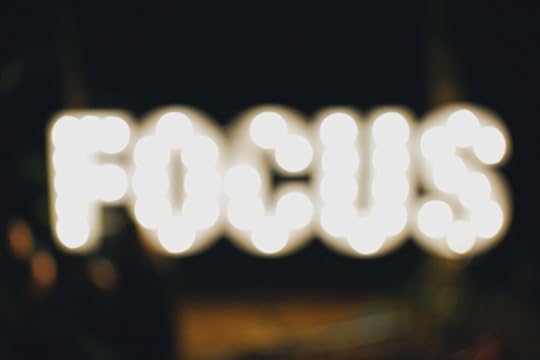
This past week, the apostle Paul’s warning from Ephesians 5, has really been on my mind: “So be careful how you live. Don't live like fools, but like those who are wise. Make the most of every opportunity in these evil days.”
I’ve heard it said that every generation has its own cultural and spiritual ‘blind spots’, and if that’s true, then I think busyness might be one of ours.
Our culture is just so obsessed with the pursuit of more: more work, more money, more achievements, more success, more influence, more stuff. But often less is actually more. Less rushing around, less cramming things in, less spreading yourself too thin, and less pushing yourself so hard…
I think a lot of the busyness, in my life at least (and I don’t think I’m alone here!), is caused through accepting endless distraction coming at me through my phone, and also by mindlessly taking things on and just saying yes to everything.
Often saying yes and taking on ‘more’ can seem like the better options, and even more spiritual option, can’t it? Because ‘yes’ is the word that makes things happen. But increasingly I am finding that it’s actually when I take on less, that I am able to be more available to God and to others around me, and also more in touch with my own emotional needs. So for me, this current season presents the opportunity for a bit of a re-set.
But please don’t take this as me saying that everyone has been sat at home twiddling their fingers during this pandemic. I work in the NHS (the national health service) - and those first few weeks when the virus peaked were especially brutal! I was working over-time and also trying to home school simultaneously.
But even so, I recognise that my overall pace of life changed; suddenly there was no commuting, no school runs, no church meetings, no social obligations, no family events, and no children’s activities to run around for with my son...
So now, in this window of time, before everything restarts again and I just fall back into being over-loaded, it feels like it’s time for some honest reflection about my priorities, and a chance to make some brave choices about the future.
What’s in or out?
How about you? What are the things about life before quarantine that you want to pick up again, and what are those things you might want to leave behind?
Try to be really intentional about thinking this through and be accountable about it too. Why not talk about it with your partner, your family or friends and agree some changes together? You could even make a list of what’s in and what’s out to help really focus the mind.
Be honest, be brave, be creative… but also, be realistic too! For example, I know that as lock down eases, not everything in my life is up for debate… and as much as I would like to never have to return to my full time job at the office again, we still have the same bills that need to be paid!
But whilst I can’t cut out work altogether, I can talk to my employer about working in a way that better suits my needs. For instance, I’d like to continue to work at home some days so that I can cut out the commute and be home to pick up my son from the school gates at 3.30pm, rather than have him in after school club til 6pm every day.
Chances are that the changes that you need to make will look different from mine. And whilst some of them might be major, some of them might just be small adjustments too. The most important thing is that you are intentional and don’t just get sucked back in to the same old, same old… if that same old wasn’t working too well for you.
And if you take nothing else away at all from reading this blog, know this: Your life and your time is a gift from God, and you get to spend it however you choose…
Read more by author
July 7, 2020
One step forwards, two back…

This blog is entitled ‘One step forwards, two back’ because this is our infertility journey currently feels.
But whilst we are discouraged we are not without hope, and I’ve written this to share what I’m learning with anyone else wrestling with those worrying what’s ifs, why nots and when’s in life.
One step forwards, two back...We finally got a prescription for a fertility drug called clomiphene (clomid) last week as our recurrent miscarriage clinic has reopened after being shut since lockdown began.
‘Hooray!’ I though. ‘We can finally start trying to conceive again next month, and with new fertility drugs that might give us an extra boost too!’
But oh no…
Because lately I have had also an issue with some irregular cycle patterns, and our consultant says it’s a concern - especially now that I’m of an ‘advanced maternal age’ (as medical professionals so delicately refer to being 40+); concerning enough to warrant some further investigation.
So now we’re back to waiting again...
Waiting for another referral, then another appointment to come through. And that will almost certainly be followed by an inevitable wait for test results, then a further appointment to discuss our next steps…
So right now, it really does feels like we’re moving one steps forwards, then two steps back.
What if?
We’re told that this should all happen within a few weeks, and after already having our plans ‘on hold’ for months during COVID-19, I figure it’s hardly worth getting stressed about a little bit more waiting now. But I do feel apprehensive about what they might find.
What if the tests unmask another unexpected, and as yet undiagnosed fertility issue? And what if it can’t easily be fixed?
Equally, what if everything is fine and we try using clomid but it doesn’t work? What then? Where does that leave us?
What if, what if, what if...
It’s a small, simple phase, but it carries a lot of weight. Uncertainty. Fear. And a lack of control.
But really, what is the point of asking ‘what if’, or worrying about all of the possible worst case future scenarios before they even happen? It doesn’t change anything at all. Instead it’s much better to wait and see what happens, and then respond to what unfolds.
And I don’t mean that in a ‘bury your head in the sand’ kind of way. I’ve found that pretending that everything is fine by ignoring your emotions only tends to make them come out sideways. Instead, I’m trying to acknowledge them but keep them in check, through daily reflection and honest journaling about how I feel.
Even if not…
Do you know what I’ve realised recently as I’ve tried to identify and manage all of those little anxieties, fears and ‘what if’s’? Often those small fears and worries are all just masking over our greatest fear of all.
And I think that my greatest fear in this situation is this: What if’ things don’t improve, or don’t ever work out they way I hope? What if God doesn’t come through for us? Where will that leave us, and what will it do to our faith?
I guess it’s a pretty natural worry to have, whenever we feel out of control and out of our comfort zones when it comes to trusting in God.
But here’s what also struck me this week: What if we could switch up our biggest ‘What if’ for an ‘Even if not’?
You see, ‘what if’ is about fear, anxiety and trying to hold onto control, but ‘even if not’ is about choosing a posture of openness and trust instead.
The best example I can find of this mentality is in the story of Shadrach, Meshach and Abednego, from the Book of Daniel. If you ever attended sunday school it will probably be a familiar one; these three zealous men of faith are thrown into a blazing furnace by King Nebuchadnezzar because they refuse to bow down and worship his false gods.
And right before they are thrown into the flames, this is what they say:
If we are thrown into the blazing furnace, the God we serve is able to deliver us from it... But even if not, we want you to know, Your Majesty, that we will not serve your gods or worship the image of gold you have set up.(Daniel 3: 16-18)
But what inspires me about this is not so much the first part of their response, which tends to get focused on as as an example of their great confidence in God. Instead, it’s that little phrase that comes afterwards which really jumps out at me, ‘But even if not… we will not serve your gods.’
Taking the posture of ‘Even if not’ is essentially about saying, this is what hope for and believe that God can do, but even if he doesn’t, I believe that God is still in control, and that there is still goodness ahead for me...
And so I wonder, could our response be the same?
Could I say, ‘Yes I believe that God is able to heal my body and give us a healthy second child. But even if not... I will we still trust Him with my heart, my family, and my future?
And could you apply this to whatever situations or circumstances you might need to trust God with right now, or in the future too?
It’s such a challenge, but what I learn from reading this story is that it helps to resolve this question before you hit a crisis in your life, just as Shadrach, Meshach and Abednego had.
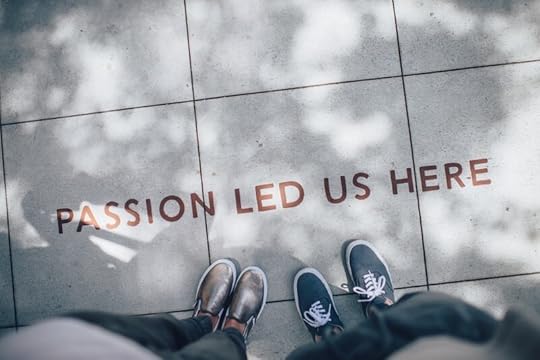
It’s interesting that quite a few times over the past couple of years, people have said to me, ‘Oh I think you’re so strong. I don’t know if I could still believe in God if I had walked in your shoes…
And I know it’s meant as an encouragement. But we have wrestled with our questions and doubts in the face of loss just as much as the next person would. And at times we have felt angry, disappointed and confused.
But the truth is that choosing to trust in God ‘even if not...’ is really not as hard a choice as you might think. In fact it’s really not much of a choose at all. Because what’s the alternative?
Whenever you come face to face with loss or suffering of any kind, as a person of faith there really are only two options ahead of you: Either you allow your pain to propel you towards God, or you let it push you away from Him. And either you find a way to keep putting your hope in God as you grieve, or you choose grieving with no hope at all.
That’s why we have landed where we have. It’s not brave, it’s not strong, and it’s not particularly remarkable either. No one wants to face suffering, but when it comes, trusting God through your pain is the least worst option ahead of you.
Besides, just like Shadrach, Meshach and Abednego, we already made a decision to put our trust in God many years ago. So why would we turn back now? Where else would we go with our pain? Or to what else would we turn?
Is there any better place of comfort for today, any better promise of our healing for tomorrow, or any firmer hope for our future than in Him - a hope that even extends beyond the grave?
Right now, I still believe that God is able to give us the family that we hope for... but even if He doesn’t, may I always be able to say ‘Even if not’.
Read more by author
June 24, 2020
Everything is on Pause

When plans are ‘on pause’
It feels like everything is cancelled, or at least ‘on pause’ right now, pending lockdown being over.
Birthdays, holidays, summer plans, business plans, family visits, social events, church, school, exams; all cancelled or on pause until further notice. And even though most things can be deferred and re-planned again in the future, it still feels disappointing.
But what about those things that can’t be put off until later? What about those things that can’t be rescheduled again for next year?
By far the biggest disappointment in this season has been having to put our family planning ‘on hold’ again.
Unfortunately, we hit the six months mark in trying to conceive again after our last miscarriage, just as were heading into lockdown. That’s the exact point at which women of my age are offered fertility support in the UK.
My consultant told us that she wanted to prescribe us with a fertility drug called Clomid, but unfortunately we can’t access it until the lockdown is over and hospital outpatient appointments are back up and running as normal, since they would need to monitor me.
“Just call us as soon as the service reopens, and I’ll prescribe it for you” she said. No big deal. But alas, 4 weeks of lockdown quickly grew into 12 weeks of lockdown, and now 12 weeks has been extended again… indefinitely…
And so now all we can do is wait, and hope that by the time life gets back to normal it isn’t too late.
Waiting indefinitely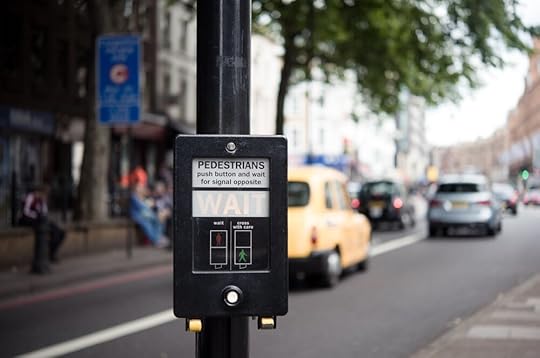
I hate that this season of infertility and loss has become such a long and drawn out part of our story. And I hate how endless the waiting has become…
Sometimes it feels like our waiting is endless.
Waiting for pregnancy…
Waiting for recovery after miscarriage…
Waiting for appointments…
Waiting for tests, results, advice, and new drugs or treatments to try…
Then waiting for a pregnancy again…
As anyone who has ever faced any type of infertility will tell you, the waiting can just drag on for years and years.
And now, of course, because of the coronavirus pandemic we also face extra waiting on top of our waiting.
Waiting to see when services will re-open.
Waiting to see if we are still able to get pregnant, once we can access treatment again.
And waiting to see if the drugs I was prescribed after our last miscarriage will make any difference to any future pregnancy outcome.
There’s lots of things that are difficult about recurrent miscarriage, but I think it’s the waiting that gets us down the most. It’s that sense of not being able to move forwards with something, but not being able to move on from it or leave it behind just yet either.
And after three years in this limbo, 2020 was meant to be the year that would finally bring about a conclusion for us; either we would get pregnant again or not, and either the treatment would help or not. But either way, we would have a conclusion and finally be able to move on with our lives.
Or so we thought at the beginning of this year. But now, instead everything is ‘on pause’.
This is so far from where we want to be right now and yet we can’t do ANYTHING to change our situation at all.
And so we continue to wait.
More than a pause?
The hardest thing about waiting is the inconclusiveness of it; it’s not a full stop or final ending; it’s just a rest, or a temporary break.
But isn’t that also the good thing about it too?
A pause in a sentence allows the reader to catch their breath before they carry on with what comes next.
Sometimes people even talk about a ‘pregnant pause’, meaning a long pause in speech that indicates significance, meaning and the anticipation that there’s still more waiting to unfold…
So, what if ‘on pause’ is exactly where we’re supposed to be right now? And maybe it’s exactly where you are meant to be right now too?
I know that not everything about this year has been good. Some of it has been really hard. But what if 2020, the year in which it feels like the world has been turned upside down, is exactly the moment of pause, the time for reflection, and the shake up that we all need?
Could this even be some kind of spiritual interruption, or a ‘kairos’ moment?
In ancient greek, the word ‘kairos’ literally means the right, critical or pre-appointed moment in time. It’s a kind of holy invitation to pause intentionally, with a focus on realigning ourselves or making a change.
If so, then what?
Could this really be a kairos moment, where God is calling us take a holy pause or trying to get our attention? And if so, then how are we to respond as people of faith?
In Mark 1:15, Jesus spoke of just such a moment, as he was starting out his public ministry, saying: ‘The kingdom of God is at hand; repent and believe’.
Repentance sounds like a pretty old-fashioned, religious word I think, but it really just means to change the way you think or see something.
And it’s pretty easy to see how this principle might be applied to our lives today…
Maybe this season of pause is a chance for all of us to change the way we think about some things; about our environment, about racial division, about our economic systems, and nation states.
Maybe it’s time to recognise that we’re all far more closely inter-connected in this world than we thought. What affects some of us, eventually affects all of us. So maybe this moment is a call to start healing some of those divides.
But maybe it’s also an invitation for each of us as individuals too, right here in the middle of the waiting and frustration and disappointment of this season. And maybe it starts with asking God what he wants to reveal to us through this interruption.
Because although this year had been a huge shock for most of us, I am absolutely convinced that it is not a surprise to God. And as much as I have complained about my own plans being paused again, maybe this is exactly the season of preparation and realignment that I need right now.
How about you?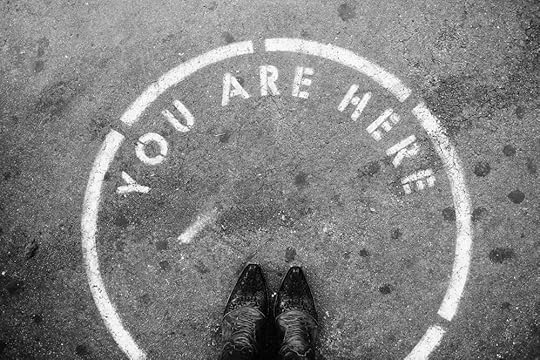
Sometimes a pause can be a chance to stop and take stock of where you currently are, as well as a chance to get as ready as you possibly can be for whatever is going to come next.
For me, that next could be a healthy pregnancy… or not.
But either way, this moment of pause lends me the chance to make sure that I am in the best possible place mentally, physically and emotionally before we continue onto the next phase of our fertility journey.
So what about you? What might God be trying to bring to your attention in this moment of pause? What might He be wanting to say or to show you?
If you already know the answer to that, then the next question is ‘How do you need to respond? What do you need to change? Where might you need to realign your thinking?
But if you don’t, then just start right here…
Start with asking ‘What is this pause all about?’
Read more by author
Subscribe to Notes On Life
You can sign up here to receive my latest blogs straight to your email inbox.
Email Address
Sign Up
We respect your privacy.
Thank you for subscribing!
June 22, 2020
On Waiting Well

I hate waiting.
I hate waiting. Doesn’t everyone?
I mean, “Bring on the wait!” is something that no one said ever.
But this week something important has occurred to me about waiting, maybe for the first time.
God is in the waiting.
He’s in our waiting just as much as He’s in the moment of resolution when everything is finally made right again.
And I don’t mean that just as some kind of superficial spiritual platitude for papering over our deferred hopes or unanswered prayers either.
He really does dwell in those spaces of times when we’re still waiting for healing, for direction, for breakthrough, or for the fulfilment of his promises.
He’s in the waiting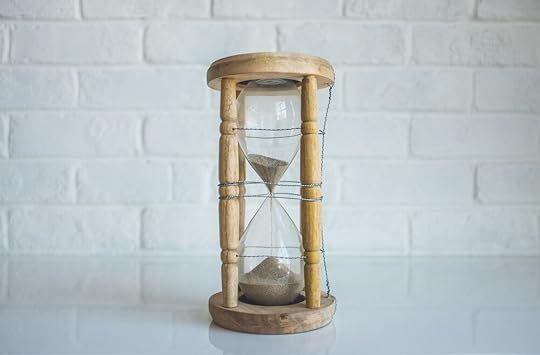
So often we can be impatient for the unfolding ending to arrive, because we think that’s the point at which God shows up.
But when I look through the Bible I’m reminded that it’s often in the middle of seasons of waiting when God is most actively at work.
God didn’t just appear to the Israelites when they finally reached the promised land, he showed up in a burning bush right at the start of their wilderness journey, and he continued to show up and work miracles for them again and again throughout their 40 years of wandering.
It was whilst David was still living as a cave dweller in hiding from Saul, that he was anointed to be Israel’s king. It was whilst Joseph was still imprisoned, that God started speaking to him and helping him to interpret people’s dreams. And it was on the very first day that Daniel began praying, that an angel was released in response to him.
In each of these stories, and many more besides, the Bible paints a picture of a God who is present and actively working, even as his people wait.
And if He was in the waiting then, isn’t He also still in our waiting today?
Taking Heart
Psalm 27: 14-15 is a passage I keep finding myself drawn back to at the moment, and it says this:
“I remain confident of this: I will see the goodness of the Lord in the land of the living. Wait for the Lord; be strong and take heart, and wait for the Lord.”But whilst I think this is a beautiful passage, what does it really mean in practice?
How do you begin to be strengthen yourself in the waiting?
How do you remain confident in God’s goodness, when your experiences haven’t seemed to line up and you’ve been left disappointed again and again?
Honestly, it’s something I’m still trying to figure out fully myself, but here’s a few ideas below.
6 ways to wait well
1. Keep a daily thankfulness list in your journal
When you’re facing disappointment it’s really easy to let it swallow you up whole and to lose all hope. So try to recall examples of God’s faithfulness to you in the past, and goodness to you in the present every single day. Make it habitual and keep a record. Ann Voskamp’s book ‘One Thousand Gifts’ is a great place to start if you want more inspiration on this.
Every time you speak negativity or hopelessness over your situation it is just reinforcing that negative message in the neuro-pathways of your brain. So stop speaking out your worst fears over yourself.
If you want to feel more hope-filled, choose words of hope and life instead. As Proverbs 18:21 says, "Death and life are in the power of the tongue” so choose to speak life over your situation.
3. Stay in the word
When things are painful or challenging, or when you feel frustrated or stuck, it’s really common to want to avoid God and just numb out, but this is when you need to read God’s word the most. It’s the very best source of hope and truth and reading it renews your mind. If you find this hard, why not use a daily devotional or bible reading plan to help you?
4. Keep a soft heart
It’s so easy to become angry and hard-hearted, towards God or towards other people when you’re struggling; but keep actively breaking up the hardness because soft soil is what allows new life to grow up.
For me, this generally means being quick to thank God when others are blessed, and quick to ask for help when I’m feeling bitter or struggling.
5. Stop comparing
Following on from the last point, one of the easiest ways that I find bitterness grows up is when I start comparing my life to other people’s, and complaining that it’s not fair. It may be understandable to feel this way, but it never makes me feel better. It only eats me up inside.
Besides, we don’t really know what it feels like to be in someone else’s shoes, or what silent struggles they might be going through too.
6. Focus on the preparation
What can you do now whilst you are in this pause, that won’t be possible when you are ‘there’? What preparation can you make? What positives can you glean?
Invest more time together in your relationship as a couple, get some of those house chores finished, invest some time developing a new skill, or get yourselves physically in good shape.
Read more by author
Subscribe to Notes On Life
You can sign up here to receive my latest blogs straight to your email inbox.
Email Address
Sign Up
We respect your privacy.
Thank you!
June 15, 2020
Supporting a friend through grief

Have you ever wondered what to say after a friend has lost a baby? Or felt tempted to avoid the subject because you were afraid you might say the ‘wrong’ thing?
One of the most frequently asked questions I get from people who know my story of recurrent miscarriages, is how can they can support a friend or loved one through loss, so I thought it might be helpful to share 10 of my tips and ideas in this space.
The following suggestions are based on my own experiences of having been through three miscarriages, as well as from what I’ve learned in conversations with other grieving parents.
There is certainly no ‘one size fits all’ when it comes to supporting someone through their grieving process, but hopefully this article will help a little bit...
It’s so easy to want to avoid hard subjects, or to say nothing at all our of a fear of saying the wrong thing. But the truth is that saying nothing is the very worst thing you can do.
Saying nothing, even out of a good intention, doesn’t communicate nothing. It communicates that you aren’t interested, don’t care enough to put yourself out for that person, or don’t recognise the loss as a significant thing. So instead, how about trying one of these simple statements?
“I’m so very sorry for your loss.”
“I can’t imagine what you are going through right now.”
“I don’t know what to say, but I want you to know that I am here for you.”
“I went through something similar once, and I know how rough it can be. I am here if you ever want to talk about it.”
“Let me know if there’s anything I can do.”
“I have no words, but I am thinking of (and/or) praying for you.”
If you find it uncomfortable to do this is person, a text, or better still, a hand written card or note dropped through the door is also much better than saying nothing at all.
In the days that immediately follow a loss, small gifts such as flowers, plants, chocolate, a book, or a bottle of wine can be important because they communicate that you care, your are thinking of them, and that the other person is not left alone.
One of the most thoughtful things that a friend ever did for me was made up a hamper of all my favourite things; a book, some tea, some chocolates, a nice journal, a candle and some bubble bath and salts.
It may feel like nothing, but offering practical support in the days and weeks that follow a loss can be really important. Things such as taking over a pre-prepared meal or even a takeaway (if you don’t have time to cook) can be a huge blessing because it just helps to lift off one extra responsibility, especially in those very early days.
Likewise, if a couple already has another child, why not offer to take the child for a play date with your kids for a few hours or offer some babysitting so that they can get out and have some space and time together to relax and talk, without the distractions of being at home.
I know that it can be uncomfortable to talk about death and loss, but try to create the space in your friendship for it. Some people naturally want to verbalise and work things through out loud more than others, but the important thing is that you make it clear that you are available if they ever need a listening ear.
Try to make the offer explicit, not just assumed - and if they do take the offer up at any point, try to do exactly that. Just listen; don’t feel the need to answer or fix everything.
At different points in the grief cycle, a person may not want to talk about what’s going on or how they’re feeling specifically. And in those times, often just offering your company is enough.
Why not just offer to go round and watch a movie with them? Or take them out somewhere nice for a change of scene…
I say this because initially after a loss, there tends to be a flurry of support and gifts and gestures and an outpouring of messages and prayers - and all of this is great. But what happens in the weeks and months that follow beyond that?
Being a good friend to someone who is grieving requires a recognition that the road of grief travelled is often a long one. Healing is not something that is completed within weeks or even months, and it’s rarely a linear process either.
So be committed to walking alongside someone for the long haul; be prepared to laugh when they laugh, and mourn when they mourn. And try to continue to be mindful of any key triggers such as other friend’s pregnancy announcements or baby shower invitations.
This is a particularly important one for close family or friends. Make a note of any key dates such as due dates that were missed, or anniversaries of a loss. And also be aware of key trigger dates such as Mother’s Day too.
You may want to directly acknowledge them if you think it’s appropriate to do so, but even if you don’t, you can still be mindful that it will be a sensitive time and help support them by extending extra grace or prayers behind the scenes.
It’s so easy to fall into using sweeping generalisations or spiritual cliches such as ‘It just wasn’t meant to be’, ‘Its just nature’s way’, ‘It will happen at the right time’, ‘Everything happens for a reason’, or even ‘God has a purpose, just trust in His timing’.
I know that all of these comments are well-intended, but can I urge you to really think through it before you say any of these kind of things out loud?
Firstly, some of these things are not quite true. Are all miscarriages really ‘for the best’’? Samples from my last pregnancy showed a 100% genetically healthy fetus, but I lost the pregnancy anyway. And even if you think they are true, just consider whether it is the best time to say them out loud. Does a woman who has just lost a baby really need to hear that it is all part of God’s plan? Personally, I don’t think so.
There may well be a time for trying to make sense of the loss, but this is generally not a conversation to have when the pain is still fresh and emotions still raw. And generally, I’d always wait for the other person to instigate that kind of conversation.
9. Never say ‘At least…’Oh, this little phrase… it often seems like offering reassurance, but it can uncover a multitude of unhelpful or mis-timed opinions.
…At least it happened early.
…At least you know you can get pregnant.
…At least you still have time to try again.
…At least you already have a child.
I have heard all of these lines before, and many more besides. And do you know what? It’s never once helped.
Of course a scenario can always be worse than it is, but as tempting as it is to try to point out the positives in a situation, why not just practice sitting with someone in their pain for a while instead? Loss is loss and grief is grief. It really doesn’t come in degrees.
Whilst showing your care practically and offering a listening ear is often enough, there are also times when someone might get ‘stuck’ in their grief or be really struggling in a way where they could benefit from some more specialist help.
So it is useful to have some ideas of where to signpost people to for further support, should they need it. This could include useful websites, books and resources, support groups, and sometimes even trained counsellors.
A helpful list of further resourcesI have created a separate list of resources that I personally recommend for women who have experienced a miscarriage, infant loss, and/or ongoing infertility issues, in a separate post which you can access here.
You can sign up here to receive my latest blogs straight to your email inbox.
Email Address
Sign Up
We respect your privacy.
Thank you for subscribing!
June 8, 2020
Reflections on Racism
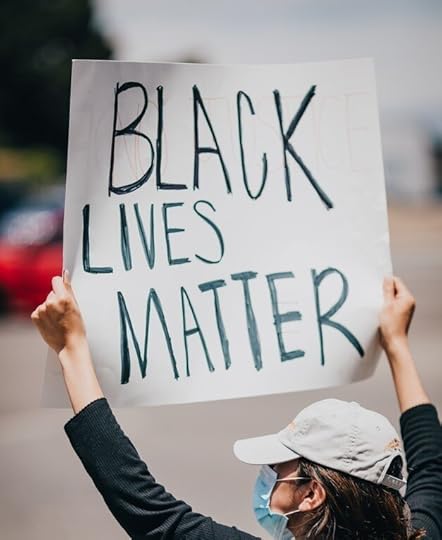
Reflections on Racism
It’s hard to know how to respond to the events unfolding in America right now; racially motivated murders, scenes of police brutality spurred on by white privilege, and to jarring images of a president forcibly removing peaceful protesters for a photo opp whilst wielding the Bible.
The truth is that I have no adequate words (or hashtags), and I feel unqualified to even try to find any.
But at the same time, saying & doing nothing no longer feels like an option either…
About white privilege
Like many of us, I am left stunned, shocked and asking questions. How is this still even happening in 2020, more than 50 years on from the civil rights act? Aren’t we better than this?!?
But deep down, I know that is at least in part, my own white privilege talking…
Just as terms like ‘social distancing’ felt completely alien to me a few months ago, so ‘white privilege’ and ‘racial reconciliation’ are ideas that I’ve never really needed to consider in any great depth before either.
The truth is, I didn’t realise that these things were still such large issues for so many black Americans, because as a white Brit, they have not personally been issues for me.
But isn’t this exactly what white privilege looks like? It’s a privilege not to be directly affected by something, and to have choices about whether you will bother to engage with it or not.
You see, I haven’t ever needed to worry about whether my son will be safe jogging on the streets as he gets older, just because of the colour of his skin.
Or about whether my husband will be pulled over by police and forcefully interrogated just for being in the ‘wrong’ place at the wrong time.
I haven’t ever really felt the intimidation of being the only person that looks like me when I enter a room.
I haven’t ever experienced oppression because of my culture or background, or weathered the subtle offences caused by cautious looks or poorly landed words.
That is the white privilege that so many of us have unknowingly, yet comfortably, lived in for so long.
Know better, do betterDo you know what I think?
It’s really not enough to just sit back and say, ’This is nothing to do with me’ anymore. To do and say nothing is to uphold the status quo. And when the status quo is systemic racism, injustice and police brutality towards people of colour, it just isn’t an acceptable standard.
It's also not good enough to try to deflect or diminish our responsibility by trying to argue that some black people are also in the wrong right now too. Wouldn't you feel angry towards the systems of power too, if you had walked a day in their shoes?
A moment like this requires all those of us in the white majority try to better empathise and understand what it feels like not to be.
And I’m not writing this with any sense of judgement over myself or anyone else, because we simply don’t know what we don’t know or have never been told.
But as one of my favourite black American authors Maya Angelou once put it: “Do the best you can until you know better. Then when you know better, do better.”
“Do the best you can until you know better. Then when you know better, do better.”It’s a line I just can’t get out of my head this week.
We are in a cultural ‘watershed’ moment right now, and there’s a fresh invitation to all of us who live in the comfortable white majority to open our eyes to the systemic racism that still exists in our world, and to choose not look away any longer, or just to ignore our own cultural blind spots – just because we can.
And for those who are part of a black, asian, or minority ethnic (BAME) background, there is also a challenge in terms of being gracious and open-hearted towards all those of us who are trying to listen, learn and change.
My own experience
As a Brit, I think it’s also far too easy to say ‘Oh, that’s just America’s problem. We don’t have the same racial history. Things like that just don’t happen here.’ But the truth is that our nation was built on slavery and colonialism, and prejudice, racial inequality and fear of those who are different to us still exists here too.
You can see it in our government’s recent treatment of the so-called ‘windrush generation’ and in the unkind politics of Brexit. It was evident in the horrific murder of a young British Member of Parliament (MP), Jo Cox on the streets of the community where she served in 2015 for her politics of tolerance by a far right supporter.
It also remains apparent in our prime minister’s refusal to apologise for historically referring to black people as ‘piccaninnies’ and muslim women wearing burkas as ‘letterboxes’. And it’s there in the fact that the black female MP, Dianne Abbott, single-handedly receives half of all online abuse directed at MPs.
Sadly, we are not yet the beacon of tolerance that many of us would like to believe we are in the UK. And it’s not good enough for Brits to say ‘But America’s problem is far worse’, or for American leaders to stand on platforms and say, ‘But look at China’s human rights record’. This is not a race to the bottom.
The truth is that no society is totally exempt from the effects of racism, and until it is no longer an issue for anyone, it should concern us all a lot more.
There’s no excuses left to lean back on now; we know exactly what is happening to our black brothers and sister across the world. In fact, they have been telling us for years and year…
So now we know, how can we do better?
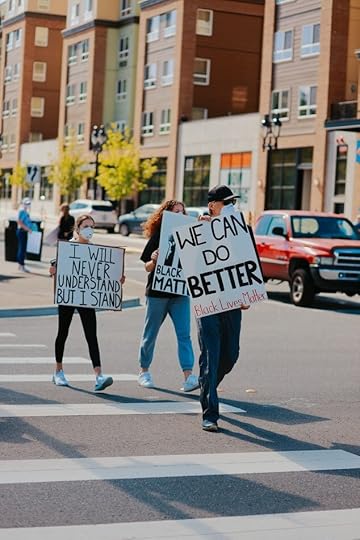
In all of this, I am reminded of how much I still have to learn personally about white privilege and racial reconciliation. I’m not sure that any of us have all the answers yet, least not me. But I know that it starts with a posture of humility and requires intentionality to be a part of the solution.
So here are a few ideas as starting points that I am working on, and that I’d invite you to join me in considering too.
1. Don’t stay silent.
You may not be comfortable with attending peaceful a protest rally right now because of lockdown restrictions or concerns about the safety of being in large crowds, and understandably so. But there are other ways to speak up against racism too – so join the social media movements, share helpful articles with others online, and sign the petitions.
And most of all, be willing to challenge and speak out against any form of racism or injustice, wherever you see it - whether that’s actions of exclusion, words of prejudice, or jokes with a racist root. And be aware that staying silent is also taking stance.
2. Keep sense-checking your own environment.
How homogeneous are your social circles? How white is your workplace, your friendships groups, your church, or even your facebook page? Keep asking yourself how can you actively seek to be more inclusive of those who look, speak, think, vote, or even worship differently to you.
I really think this is a challenge for all of us, regardless of racial identity. Of course, we can’t change our racial identity, the culture we grew up in, or even how multicultural it is where we live… but we can all seek to learn and grow.
3. Intentionally expand your choices
Consider how much BAME content you are consuming. What are you watching on Netflix? Which authors do you read? What are do you enjoy? What music or podcasts are you listening to? Try to expand your awareness of and appreciation for other cultures. Don’t always stick to what you know. And if you’re a parent, try mix up what your children are culturally exposed to too…
4. Read up on white privilege and racial reconciliation
Start learning from BAME thinkers, faith leaders & writers, particularly those working in the field of racial reconciliation. There are lots of good resources out there, but here are a few books that I’d really recommend checking out as a good starting point:
Osheta Moore – Shalom Sistas: Living Wholeheartedly in a Brokenhearted World.
Austin Channing Brown - I'm Still Here: Black Dignity in a World Made for Whiteness
Latasha Morrison – Be the Bridge: Pursuing God’s Heart for Racial Reconciliation
Jo Saxton – The Dream of You: Let Go of Broken Identities and Live the Life You Were Made For.
5. Learn about your own roots.
Take the time to learn about your own racial history. In the UK we don’t have a history of racial segregation, but we were still complicit in the oppression of people of colour through empire building and the slavery trade for many years.
What’s more, the city of Liverpool, where I live, built up most of its prosperity, influence and reach, by becoming a major world trading port during the industrial era - an industry under-girded by slavery. (Incidentally, if you live in the area and have never visited The Maritime Museum and the International Slavery Museum on the Albert Dock before, you really should check them out…)
7. Determine to stay well informed.
Try to watch and read as much news coverage on this subject as possible. Aim to stay well informed, and not just for the next few weeks whilst it receives a high level of media focus, but also in the longer-term too. Don’t avoid it just because it makes for uncomfortable viewing, or because it doesn’t have a close proximity to you.
And try to do it without prejudice or judgement too. That means reading critically, and from a wide range of sources beyond those closely aligned to your own political views and affiliations as these will only serve to reinforce your pre-existing biases. In particular, choose to expose yourself to BAME journalism as much as possible too. Because how else do we expand our understanding, except by trying to see how it feels to walk in someone else’s shoes?
8. Drop any defensiveness.
I think this is a really challenging one, especially when feel that you aren’t directly complicit in any way for the oppression that BAME people face. It’s a pretty natural human instinct to want to defend yourself and your culture, but it’s important to recognise that traces of white privilege are found in almost every argument that tries to justify police action, minimise someone suffering, or seeks to blame its victims in some way.
So don’t use the ‘all lives matter’ argument – of course they do – but not all lives are threatened in the same way because of their race or ethnicity. It’s the equivalent of saying ‘save all trees’ when someone says that we need to save the rainforest! And don’t accept the arguments that seek to lay the blame for recent racial tensions and rioting at the feet of the BAME community either, because that is only focusing on the outcomes of long-term systemic racism, rather than addressing the cause. Does the black community seem very angry right now? Well wouldn’t you be too if you had dealt with what they have? Cut them a break!
9. Pray about the situation.
Lastly, but perhaps most importantly of all, if you are a person of faith (and perhaps even if you’re not!) I would encourage you to pray for America, and for your own nation and leaders if you’re not American too. Because prayer has the ability to change our hearts, open our eyes, and realign our thinking with God’s more than anything else can. When you prayer about something, you can’t fail to be personally moved and changed.
A short prayer
It feels appropriate to finish this blog with a prayer today:
Lord, may we each be committed to ruthlessly exposing and ridding ourselves of any prejudices - those deep down and hidden away in our hearts, or even subconscious, as well as those seen.
Lord, let us not only love with our words, and with our hashtags, but may we also love in our actions, in how we serve one another, and prefer one another’s needs.
May we be willing to do the hard work of learning about different cultures and racial identities, and quicker to build bridges with those who look, think, act, vote and worship differently to us.
And may we keep asking for more of God’s grace and love to fill us to overflowing so that we may love one another hard, love long (long after this becomes yesterday’s news), and love deep.
Lord, start with me.
#blacklivesmatter
Read more
Subscribe to Notes On Life
You can sign up here to receive my latest blogs straight to your email inbox.
Email Address
Sign Up
We respect your privacy.
Thank you for subscribing!
June 1, 2020
How grief can be transforming

Are you grieving right now?
Are you grieving right now? Or do you know someone who is? If so, the title of this blog might feel a bit jarring; how can grief become a positive, or even transformational thing?
To be honest, when I was in the deepest throes of grieving pregnancy losses, I wanted to throw my laptop across the room along with any article that suggested something like this!
I was angry. Angry at myself for not being able to cope better, angry at my husband just for being in my space, and angry at all my friends who seemed to breeze through their pregnancies easily… but mostly, I was angry at God.
How could He let something like this happened to us, not just once… but again and again? And how could a God who acted like that, ever be described as good? I wasn’t exactly blaming God for the miscarriage. I knew that He didn’t cause it, and I didn’t even believe that it was part of his will or plan it for me, but He didn’t exactly step in and stop it all either.
I haven’t written this essay as quick fix or how to guide to ‘making sense of your grief’. The fact is that loss is heart-breaking and there’s simply no short cut, or fast pass through the pain – you simply have to go journey it - and processing it takes time.
Honestly, it took months and months of wrestling with my pain to come to a place of peace and acceptance in my grief journey.
But having been through this process of grieving three times after pregnancy losses now, I know that it is possible to grieve with hope in your heart, to experience His comfort in the midst of the darkest moments, and to encounter his healing embrace through your heartbreak and loss.
It really is possible to come out of the other side transformed.
Psalm 34: 18 says that “The LORD is close to the broken-hearted and saves those who are crushed in spirit.” And in Matthew 5: 4, Jesus himself said that, “Blessed are those who mourn or grieve, for they will be comforted.” But the truth is that I never really understood these verses at all, until miscarriage entered into my story. I mean, what could possibly be ‘blessed’ about going through a heart-breaking loss?

Perhaps there’s some small comfort to be found by the kindness of a stranger in a moment of tragedy, or some fresh hope to be found in the unconditional and unwaivering love and support of your closest family and friends.
But is there ever really enough kindness or goodness in the aftermath of the tragedy of loss, that it can actually turn someone’s suffering into a blessing.
For what it’s worth, I don’t think so…
Can grief really be a blessing?
After walking through this experience of grieving after miscarriage, not just once but twice in a six month period, and then again another year later, this question is something that I’ve been forced to wrestle with a lot.
And I think that perhaps the ‘blessing’ comes not from the grieving process itself, but rather from the opportunity that this kind of suffering can invite into our lives.
Because what I have slowly, gradually been discovering is that as we actually invite God to draw near to us in our brokenness and allow Him to meet us right in the centre of our sadness and pain, something kind of miraculous and unexplainable happens…
As we choose to draw close to ‘the God of all comfort’, we open ourselves up to discovering that the God of all comfort is drawing near too.
So maybe the ‘blessing’ is not actually in the mourning at all, but in the invitation to experience God’s presence in a much deeper, fuller, and richer way – in a way that only those who have walked along this path of grief with Him can ever really know.
What’s more, it’s a blessing that can be multiplied in time as well. Because often there’s a new compassion and empathy for others who walk that path of personal pain, that only enters into your life after walking it yourself first.
For example, I know that there’s absolutely no way that I would ever have considered writing such a personal blog about my struggles with miscarriage, fertility and faith, in order to help others through their pain, if I hadn’t lived through all of this heartbreak myself first.
The greatest gift of all
Reflecting back on the last few years, it seems that the blessing I’ve discovered, right in the midst of the most unimaginable heartbreak, disappointment and pain, has been an invitation to draw closer to God, and to experience more of his comfort and peace.
This wasn’t a gift that I wanted. I wanted to never need it in the first place. And then I wanted another healthy, full-term pregnancy. Because that’s what seemed most like healing to me; to be able to replace that which was lost. But instead He gave me presence.
I always thought that God’s gifts looked like answered prayers. And sometimes they do, but often they don’t. And then what?
For a long time I felt so very angry that this was part of my life story, and so often our anger makes us to want to pull away from God rather than draw near.
But something that I’ve come to realise over time is that the gifts we seek are not the blessing at all; the greatest gift is the Giver himself.

I want to qualify all this by adding that it isn’t an automatic given that pain will become a positive or transformational force in our lives.
Encountering seasons of pain and loss is sadly a certainty that will come to all of us at various times because death is a part of our human story. But the transformational part is a choice because it depends on what we choose to do with our pain.
Will we allow God to enter into our pain, will give Him with all the broken pieces of our hearts, and trust Him to heal, redeem, and make something altogether new with those parts, just as He promises to?
Will we trust in His promise that He works all things out for our good? In our pain, our hurt and our anger, will we choose to draw closer or pull away?
It probably goes without saying, that I would never have chosen miscarriage to be a part of my story. But I also know that if I had never walked through this sadness, disappointment and loss, there would be parts of God’s character that I would never have experienced either.
He is not a God who merely sympathises with our pain – He is a God who relates, who understands, and who choose to draw near to us in it. And in times of grief don’t we need to know the One who has walked the path of pain before us?
The truth is that we follow a saviour who knows the path of suffering far better than we do, and He is simply holding out His hand asking each of us to follow Him through it.
Read more
Subscribe to Notes on Life
You can sign up here to receive all my blogs straight to your email inbox.
Email Address
Sign Up
We respect your privacy.
Thank you!



